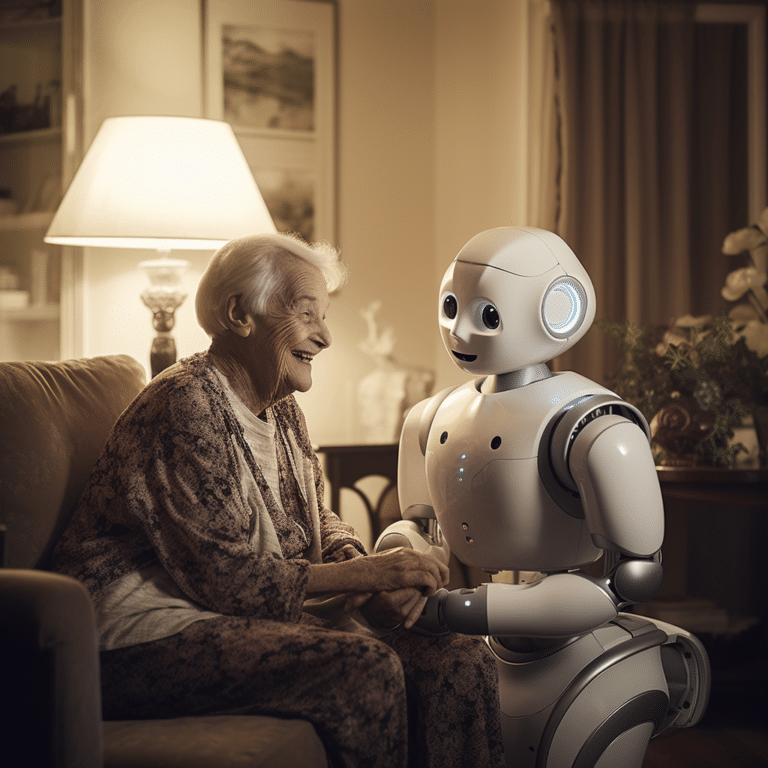By 2025, AI in healthcare’s market value will hit $36.1 billion. This article explores how AI’s transformative power will benefit home care agencies. It’ll enhance service delivery, streamline operations, and offer predictive insights. We’ll delve into AI’s role in telehealth, immersive patient experiences, and creating patient-centric environments. Let’s unravel the future of home care, revolutionized by AI.
Table of Contents
ToggleKey Takeaways
- AI can analyze large datasets of patient information to identify trends in behaviors and risk factors, leading to improved value-based care measures and enhanced patient satisfaction.
- AI technologies can streamline care processes and provide real-time insights, improving caregiver efficiency and leading to better patient outcomes and satisfaction.
- AI-powered software can optimize the scheduling and routing of caregivers, automating routine tasks and workflows and reducing costs.
- AI technologies, such as telehealth platforms and virtual reality, can enhance the home care experience, making it a more patient-centric and desirable option for individuals seeking care at home.

Understanding the Role of AI in Senior Home Care
‘Why isn’t there more discussion about how AI is revolutionizing home care, especially when it’s improving lives and allowing caregivers to deliver better services?’ One might wonder.
The role of AI in senior home care is a game-changer. It’s a tool that’s transforming the home care industry by enhancing quality care and improving home healthcare delivery.
Artificial intelligence, or AI, is being adopted by home care agencies at an unprecedented rate. It’s incorporated through home care software, streamlining administrative tasks and improving service delivery. AI in home care is not just about automation, it’s about personalization too. It understands the unique needs of each patient, tailoring care and attention to each individual.
Furthermore, AI allows caregivers to monitor patients remotely. It predicts and prevents health issues before they become serious, providing a safety net that wasn’t previously available. This not only gives peace of mind to the patient but also to their loved ones.
It’s high time we celebrate AI’s contribution to home care. It’s not replacing the human touch, but enhancing it. AI is here, and it’s making home care a better, safer, and more efficient industry.

Improving In-Home Care & Caregiver Efficiency Through AI
“Where can we see the most significant improvements in caregiver efficiency, and how is AI technology driving these enhancements?”
The answer lies in the realm of improving caregiver efficiency through AI.
AI technologies are revolutionizing home care services, helping to augment human abilities and streamline tasks.
AI algorithms can analyze vast amounts of data in real time, enabling home care agencies to make more informed decisions. They can alert caregivers to changes in a patient’s condition, allowing for immediate, targeted responses. This not only improves the quality of care but also reduces the burden on caregivers.
Furthermore, AI-powered tools can automate routine tasks, freeing caregivers to focus on more complex patient needs. This helps home care agencies optimize their resources, leading to better patient outcomes and enhanced job satisfaction for caregivers.
In the near future, AI could play an even more transformative role in home care. Advances in AI development promise smarter, more intuitive tools that will further revolutionize the way care is delivered. As such, AI is not just improving caregiver efficiency – it’s reshaping the entire landscape of home care.
Maximizing Operational Efficiency in Home Care Agencies
In their pursuit of maximizing operational efficiency of home care, many organizations are discovering that AI not only streamlines several processes but also greatly reduces the time and cost associated with manual tasks.
- AI can assist home care agencies in providing a more efficient service, enhancing care coordination, and improving the home-based care experience.
- AI’s sophisticated algorithms are capable of scheduling and tracking home care services, which leads to significant time savings. This operational efficiency enables care providers to focus on delivering quality care rather than administrative tasks. It’s a game-changer in the healthcare market, leading to increased productivity and cost savings.
- AI will help streamline communication between home care agencies, caregivers, and patients. By leveraging AI, home care agencies can create personalized care plans, ensuring that each patient’s unique needs are met. This leads to improved patient satisfaction, a key indicator in the competitive healthcare market.
- AI is transforming the healthcare system by providing predictive insights, which can help in early intervention and better disease management.
With AI, home care services are set to become more efficient and patient-centric, providing freedom and independence for those desiring home-based care.

Future Perspectives: AI’s Influence on Healthcare at Home
Undeniably, AI’s influence on home care is set to increase, and it’s expected to revolutionize not just the delivery of care but also the quality and accessibility of home care services.
The potential of AI in transforming in-home care is immense. It’s anticipated that AI will introduce innovative ways to improve patient care, particularly in home health care and senior home care.
The future of home care is envisioned with AI at the helm, providing:
- Advanced natural language processing, enabling better communication between patients and caregivers. This includes:
- Voice recognition systems for hands-free operation.
- Sentiment analysis to better understand patient mood and needs.
- Intelligent systems that can predict care needs and alert caregivers, encompassing:
- Predictive analytics to anticipate health complications.
- Real-time monitoring for immediate response to emergencies.
The quality of care is expected to significantly improve, with caregivers being able to provide personalized, proactive care.
AI is not just set to revolutionize the way care is delivered; it’s also giving the freedom that home care services need to adapt and thrive in the future.
AI Applications in Patient Care: Real-World Examples
AI applications are revolutionizing home care, as seen in real-world examples such as smart monitoring systems and digital companionship tools.
These innovations offer a lifeline, particularly for senior home residents, who benefit from healthcare at home tailored to their specific care plans and health conditions.
The algorithm-based technology behind wearable devices and virtual home assistants is an integral part of this transformation. It’s not just about convenience; it’s about giving seniors the freedom to live independently while maintaining their safety and wellbeing.
Wearable devices can monitor vital signs, alerting care providers if any abnormal patterns suggest a potential health issue.
Meanwhile, conversational AI offers companionship, alleviating loneliness and providing mental stimulation. AI is transforming the way help agencies operate, allowing them to automate routine tasks and focus on providing empathetic, person-centered care.
In essence, AI applications are not replacing human touch but augmenting it.
They are providing a safety net that allows seniors to enjoy the freedom they desire while reassuring their loved ones that they are safe and well-cared for. This is the power and promise of AI for home care.
Exploring the Potential Benefits of AI for Home Care Services
The potential benefits of AI in home care are vast, transforming the industry and enhancing the quality of life for many seniors. The integration of AI has the potential to revolutionize home care, bringing AI into the homes of those who need assistance. These benefits can be grouped into two key areas:
Improvement in Quality of Care:
- AI can offer better care through learning algorithms that analyze health records, suggesting personalized care plans.
- Wearable sensors provide real-time health data, allowing for immediate response to emergencies or significant health changes.
Enhancement of Home Living:
- AI assistants can help with daily tasks, promoting independence.
- The smart home hub, tied with AI, creates a comfortable and safe environment, adjusting lighting, temperature, or even locking doors.
The impact of AI on home care is not only changing the way care is provided but also improving the quality of life for seniors. By reducing the burden on caregivers and providing a more tailored care experience, AI is ensuring that seniors can enjoy their freedom while also receiving the care they need.

How AI Is Integrated Into Home Care Software
Through home care software, not only does AI offer two integral services – scheduling and routing of caregivers, but also helps in automating routine tasks, which in turn, improves efficiency and reduces costs.
The introduction of artificial intelligence into home care services has been a call for solutions that AI can provide. This power of technology optimizes the workflow, improving the quality of care provided.
AI is already improving many aspects of home care. It streamlines administrative tasks such as maintaining electronic health records, which can be time-consuming. This allows caregivers to focus more on the patients. Using an automated tool also reduces the chances of errors in record-keeping.
AI technology can be used to predict possible health issues, enabling early intervention. By analyzing health data, AI can also suggest personalized care plans. Machine learning algorithms have become instrumental in this regard.
In addition, AI can also help in monitoring patients remotely, ensuring their safety and well-being. This is particularly useful for patients living alone.
In these ways, AI is shaping a new era of home care services, promising freedom and improved quality of life for patients and efficiency for caregivers.
The Impact of AI on Home Care Marketing Strategies
While many home care agencies are still grappling with traditional marketing strategies, it’s clear that incorporating AI can significantly enhance their outreach and engagement efforts.
By leveraging AI technology, agencies can deliver targeted and personalized messages to their audience, encouraging them to explore in-home senior care options.
AI can also analyze market trends, helping agencies to stay ahead of the curve in the rapidly evolving home health industry.
Benefits of AI in home care marketing include:
Improved Customer Engagement: Conversational AI devices can interact with potential clients, answering their queries about caregiving services, and providing information on how these services can improve the quality of elder care.
Predictive Analysis: AI can predict health deterioration in seniors, enabling agencies to provide better care by addressing these issues early on.
With safety features in homes becoming increasingly important, AI can also highlight these aspects in marketing campaigns, assuring families that their loved ones will be well-cared for.
Ultimately, AI’s role in home care marketing isn’t just about reaching more people; it’s about connecting with them in ways that truly resonate.
Industry Updates and Testimonials on Bringing AI into Home Care
Check out the latest industry updates and testimonials on how AI is revolutionizing home care services.
AI’s personalized care capabilities have become an essential tool when it comes to senior care.
It’s helping to tackle the staffing crisis in senior homes by enabling healthcare providers to deliver better, more efficient services.
Testimonials from industry professionals highlight the positive impacts of AI. Care plans tailored to each individual’s needs are being effectively implemented, giving them the care they need while also allowing for a level of independence.
Cameras and sensors play a significant role in this revolution. These devices, paired with AI, can monitor seniors’ activities, ensuring their safety while offering peace of mind to their loved ones.
AI assistants can help with daily tasks, further promoting their freedom and independence.
| Latest Updates | Testimonials |
|---|---|
| AI's role in addressing the staffing crisis in senior homes. | 'AI has drastically improved the services we offer.' - Healthcare Provider |
| Use of cameras and sensors for safe and independent living. | 'These tools have changed how we provide care.' - Home Care Assistant |
| AI's contribution to delivering personalized care. | 'Our patients are happier and healthier thanks to AI.' - Senior Care Manager |

The Role of AI in Addressing Staffing Challenges in Home Care
As soon as they integrate AI into their operations, home care agencies are finding it easier to address staffing challenges, because it helps streamline scheduling and optimizes caregiver efficiency.
By automating tasks and suggesting the most efficient schedules, AI is reducing the strain on care resources and allowing caregivers to focus on providing personalized care to each senior in need.
The role of AI in addressing staffing challenges for home care is multifaceted:
- AI helps manage complex care plans by predicting the needs of patients and suggesting the best course of action.
- This allows caregivers to better manage their health and deliver better care.
- AI can analyze healthcare costs and resource allocation, helping agencies to optimize their operations.
- This reduces the financial strain on both the agency and the families of the seniors.
AI is not just improving care, but it’s reshaping the way care is delivered. By helping caregivers focus on what they do best – caring for people – AI technology is providing the freedom to innovate and the tools to deliver a higher standard of care.

Conclusion
As we forge into the future, the merging of AI and home care promises a profound shift in healthcare delivery. This technology, equipped with predictive insights and efficiency-enhancing capabilities, is set to revolutionize not only how care is administered but also how agencies operate. The ripple effects of AI integration in home care are just beginning to surface. Stay tuned as we continue to explore this exciting frontier, where cutting-edge innovation meets compassionate care.
Frequently Asked Questions About Senior Home Care and Artificial Intelligence
Potential ethical issues include invasion of privacy, data security risks, and loss of human interaction. AI’s decision-making process might be opaque, and there’s worry about dependence on technology or job displacement for caregivers.
AI’s designed to respect privacy. It only accesses necessary data, and with strong encryption, it ensures confidentiality. It’s a tool that can enhance home care services, not a threat to patients’ privacy.
Barriers to implementing AI in home care include high costs, lack of technical know-how, and resistance to change. However, they’ll find it’s worth overcoming these hurdles for enhanced efficiency and improved patient care.
Just like learning a new language, mastering AI’s use can be daunting for less tech-savvy patients. However, through personalized user-friendly interfaces and tutorials, AI can become as accessible as a beloved, well-thumbed book.
They’re ensuring AI doesn’t replace human touch by using it as a tool to enhance care, not substitute it. It’s about balancing tech-driven efficiencies with the irreplaceable warmth and empathy of human caregivers.
Valerie VanBooven RN, BSN founded the company after years of working in many different roles from ICU Nurse to Discharge Planner, Home Care, Care Management and more. She wrote her first book in 2003, called “Aging Answers”. After that came “The Senior Solution” in 2009.
Valerie and her staff grew as more home care agencies and senior service businesses realized the undeniable value of being found online.
- Team Member Mentions: Loren Strauss, Enhanced SEO Specialist - May 1, 2024
- (Video) Mastering Home Care Business Success: Sales Strategies and Building Relationships with Dale York - April 30, 2024
- (VIDEO) Home Care Marketing: Business Growth through Community Commitment with Jim Prussak - April 29, 2024


